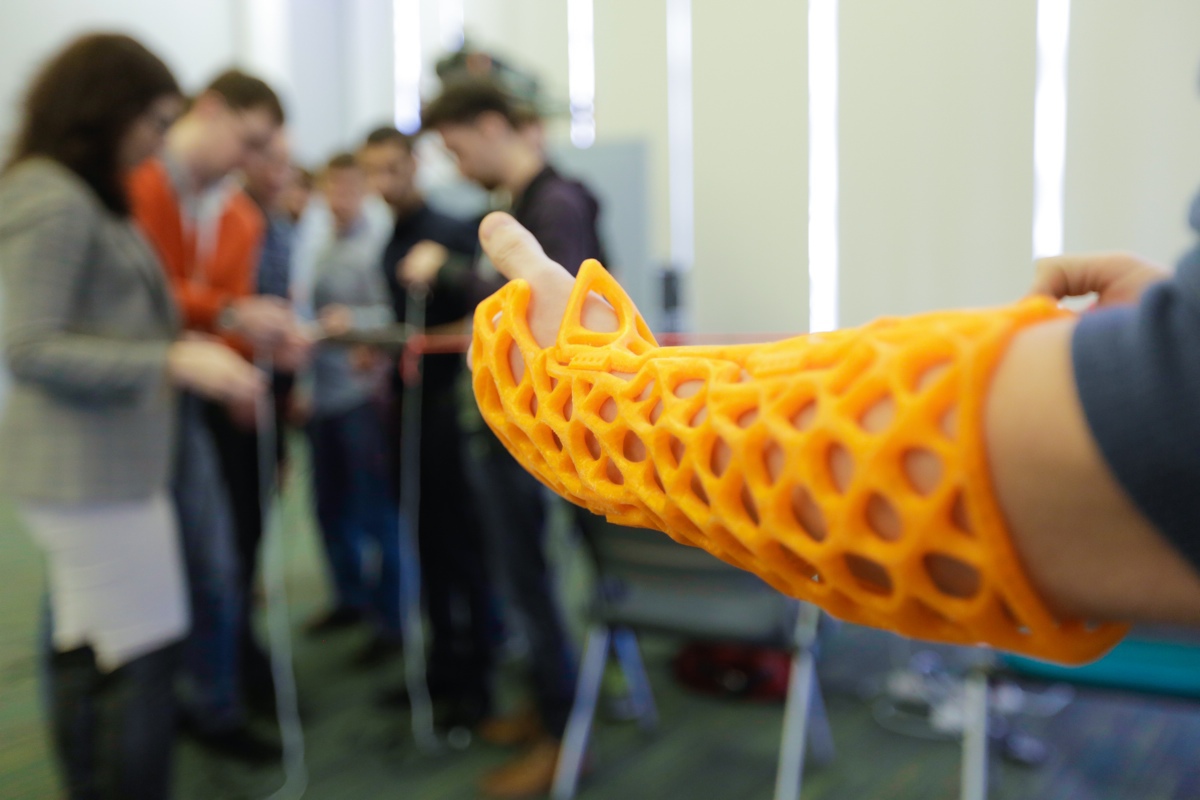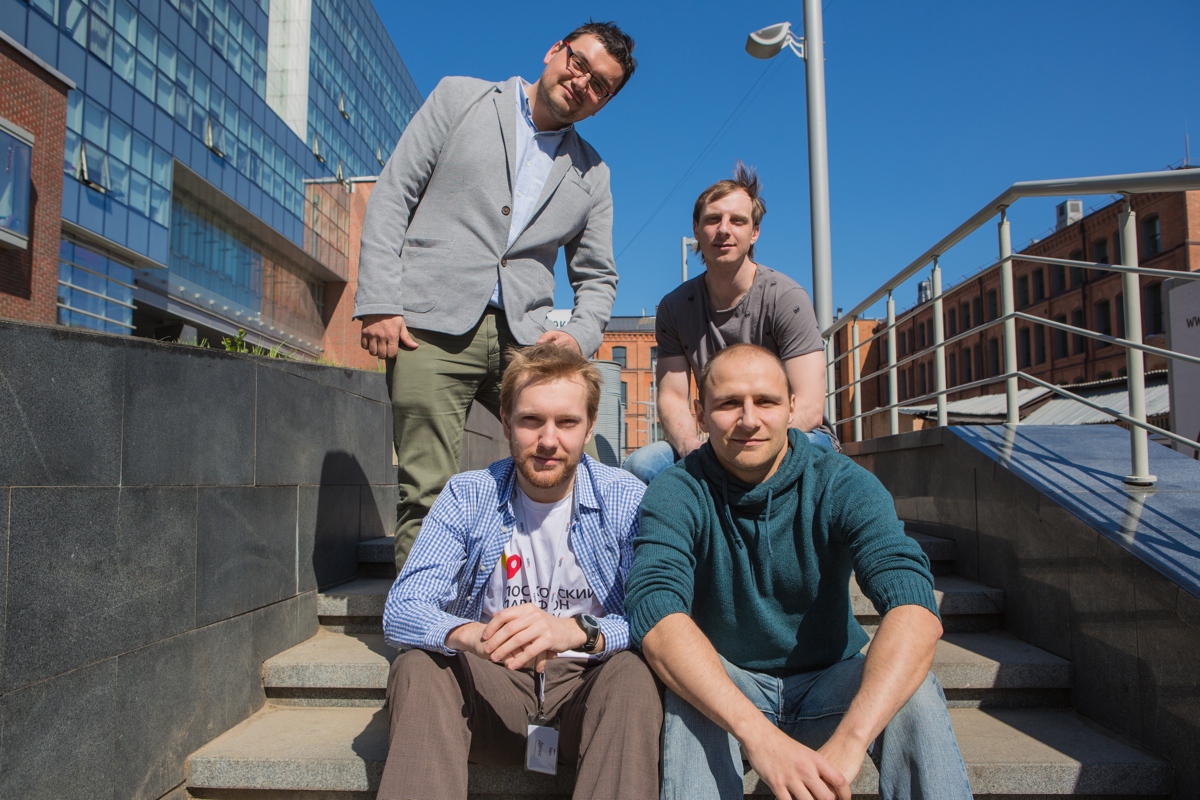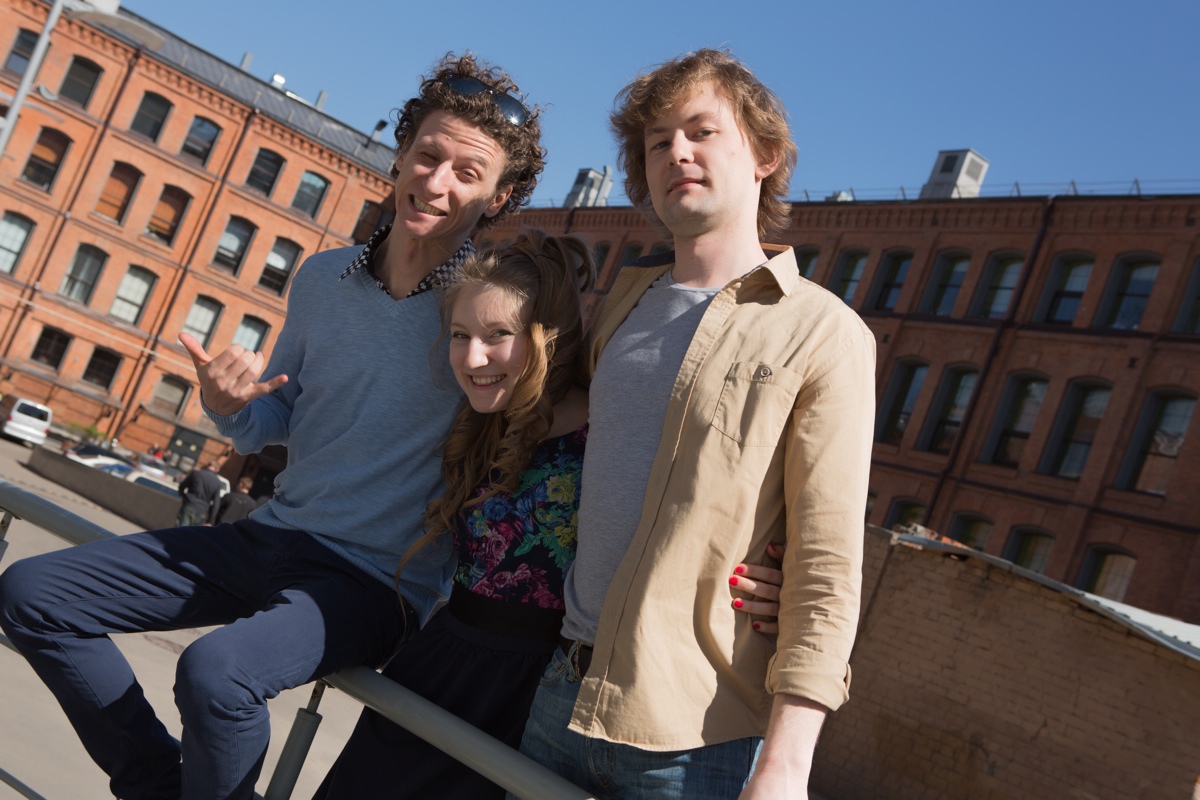Gypsum on a 3D printer and other ideas from Tolstoy Camp teams, and also - do you need it?
For several weeks, experts from Yandex and other companies helped our workshop participants create, develop, and launch their projects.
Today, the day we announce the recruitment of the next Kemp, we decided to talk with some of the cool projects that were this time, why they came, what happened, and who benefits from it.

')
There will be stories from three teams:


This year, Tolstoy Startup Camp will be held from June 30 to August 29. The workshop program consists of three stages: the formulation of the idea and the gathering of a team, the testing of hypotheses, the creation of a prototype. We have no requirements for education, experience, country or place of residence. Prerequisites: age over 18 years old, knowledge of Russian, having own laptop or other device for work.
We do not limit the participants in the choice of ideas, the only requirement is that they should be related to the IT sphere. However, there are a number of areas in which we have deep expertise and will be most useful to you. These are geo-information and search technologies, work with big data, creation of mobile applications and web services for a mass audience.
Anyone can lead the project by uniting the team around their idea. We recruit specialists in three areas simply in order to have people in the workshop with all the necessary skills. All participants, regardless of their specialization, must be ready to solve any problems - especially in the first stages of work.
If you are interested in learning how to study at Kemp, you can read the post of Suncheez , a graduate of the first Kemp. You can find out more about the rules of participation here . And if you have any questions, feel free to ask them in the comments.
Today, the day we announce the recruitment of the next Kemp, we decided to talk with some of the cool projects that were this time, why they came, what happened, and who benefits from it.

')
There will be stories from three teams:
- Zdrasprint - service to create individual clamps, which are printed on a 3D-printer and designed to replace the gypsum at certain stages of recovery.
- Globerland is a service that allows you to find translators and intermediaries in other countries.
- Gipis is an application that helps runners plan workouts and prepare for marathons. Even before the camp, he had 150,000 users.
Health sprint
Fedor (project leader): There is an opinion that the idea is worthless. I had a hypothesis that this is not so - this is one time, and two - I have a firm belief that the developed idea costs a lot. Before Yandex was just an idea. Came to Yandex, found the guys, helped develop. Now this is an idea that is worth it.
What is it? Replace at certain stages of the treatment of gypsum with an individual fixative - anatomical, individual, made according to the human scan. We found out that in Russia, 350 thousand people a year are at risk of getting complications from fractures due to the fact that they are prematurely taking plaster before their time. They do this because there are problems with hygiene - nothing can be washed under the plaster, the skin suffers and itches. Neither rulers nor knitting needles help anymore. And people take off their gypsum. The minimal complication from this is that the fracture coalesces 1.5-2 times longer, pain and discomfort are felt longer. The obvious solution is to give them some other way of fixing.
We have to register the product, then - to apply for a patent of medical technology. All this will be connected with hands, orthopedics, traumatology. There are a lot of perspectives - from bone replacement to plastic surgery.
At Kempe, we collected a scanning complex that is of sufficient accuracy for it to be used by a traumatologist. And we did it not for $ 40,000, but for less than $ 1000. Thanks to Sasha, we applied for certification. Sasha takes away from me all the tasks with which I am simply unable to cope, because I am such a top, spinning and can not cope with some basic things where perseverance is needed.
Sasha (manager and developer): Kemp's concept was very strange for me: you need to gather the right people in one place and these right people will do something. But it actually works. Our team is an example.
Fedya: There are things associated with the zone of their own comfort. If you do not go out of it, there will be no magic. At Kemp, for example, a lot of time is spent on methodology and research. It was difficult for me to perceive all this, but in the end the efforts were beneficial, although not everything was applicable to our project.
Sasha: Any person who wants to do something needs to imagine a situation when he will have a hard time. Kemp is two months full time. You need to plan your time and money, take a vacation at work, devote yourself to something. In fact, it is very cool, it gives new thoughts, it opens new horizons. I think it's worth it.
Globerland

Masha (project leader): Two years ago I lived in China and worked as a business mediator. This experience allowed me to see what problems people abroad are facing. When I returned to Russia, I realized that they are not only among those traveling to China. So I had an idea to create a certain marketplace for searching and offering translation services abroad. With her, I came here. And the first task at Kemp was to formulate my idea in such a way that other people would want to work on it. I was able to convince Anton and Vanya that the idea was workable.
We want to create an international platform for solving business problems abroad. If there is a business that wants to make purchases in a certain country, it will need the help of an interpreter, purchasers, people who will conduct market research, then there will be many, many small services, without which the business either loses money in the foreign market or in general will not be able to operate there.
Ivan (manager): There are agencies that provide similar services, but their business model does not scale. They have this manual labor, processing orders and their distribution among translators. It is impossible to grow at agencies simply because along with the increase in turnover, their costs will increase. Our costs do not grow in proportion to revenue growth.
Masha: There would be nothing without Yandex now, because it’s mostly people and support from experts. Our team has three mentors with whom we work very closely.
This is Ilya Kurylev , head of Yandex.Market Lesha Avdey and ResumUp director Zhenya Barulin. It is interesting that each of them has their own point of view, and we are forced to take all the good things from everyone. I am amazed every time Natalia Zverek. She arranges such master classes, in which I understand each time that everything needs to be changed in myself.
Anton (developer): At Kemp, I also became aware of my mistakes. For example, before I did not try to find out if someone really needed what I was doing. Usually, the idea just came in, it became interesting, and I was picking around with it.
Masha: Ilya Krasinsky helps us a lot in terms of metrics. Metrics are very important for the development of any project, and his consultations are so valuable that we really understand what things we need to work on. You can probably do it all without Yandex, but there is a chance that without it nothing would start or develop very slowly, not in this form - well, we would not have met without Yandex at all.
Gipis

Denis (cofounder and CEO): I got the name Gipis from a project of my friend who already just had a repository in Redmine . And initially I did a project about planning, but not about running, but about losing weight. This story began with the fact that I sold my company, while working in which I was very stout, because there was little activity. And we started making the service with the friend Gipis was doing, where the diet and exercise should have been planned. In a week, 30 thousand users came to us, we attracted some money, but it turned out that the story about food cannot be automated. Manual accounting of calories to people is very quickly bored, and besides this, the result is greatly influenced even by where, for example, was the potato that a person ate.
By that moment, when it became clear that it was impossible to solve this technologically, we had all lost weight and began to do service about training planning. They asked the user what activity he preferred, and began to say, for example: play football on Monday 27 minutes, and on Tuesday walk 12 minutes. But it was a completely unattached plan; people did not understand what their ultimate goal was.
And then I started running. My friends argued with me about whether I would run five kilometers. In the end, I ran a half marathon, and I had a goal - a marathon. But after a half marathon my legs hurt so much that I realized that I could not run without special training. Began to look for services that would be taught to run, but did not find.
And here I suddenly had everything overlaid: Gipis, in which there was a planning service, runners with a large market, which may not be so noticeable in Russia, but there are in the USA. In total, there are 250 million runners in the world and they have goals. Needs and opportunities suddenly docked with each other. We abandoned all types of activities, except running, left only planning and began to help people learn how to run and run some distance.
Gipis creates personal training plans that adapt to your progress. That is, these are not routine, pre-programmed training programs without taking into account human features. Planning Gipis is created specifically for you, taking into account physical data (weight, height, gender, type of figure) and from your current level of training (we analyze workouts and your running experience), and also adapts to your progress, if you, for example, missed a run or you start running faster or slower than planned.
The service is based on statistical models that are largely based on studies of the famous American runner Jack Daniels , who in the 1980s was the first to build relationships between running speed and human physiology and derived a parameter like VDOT . The problem is that it was based on the data of professional runners, members of the Olympic team. In addition, VDOT cannot grow indefinitely - human resources are limited. We applied Daniels models for ordinary people. It turned out thanks to Sergey Ilyukov , the head of the Center for Sports Medicine of Finland. Finland regularly undergoes a mandatory medical examination of the entire population, so there are ideas about what happens to ordinary people. Now we have models of Daniels and Ilyukov. When a person comes to us, he says, let's say that he can run five kilometers in 25 minutes. And we build a plan from this point. He starts to run, we see the results and relate it to one group or another, and then we build a plan, adjusting to the progress of the user himself and people like him.
I went to Kemp to understand how to make a business out of some kind of hobby, some kind of idea that unexpectedly received attention in the services market. How to measure, how to sell, how to make monetization. And all this I got here. I understood which metrics to track, how to track them, how they relate to each other, and what to pay attention to. It is very important that here we have learned to talk to people, to ask what they really need. The first month at Kemp is customer development. They were very actively pushing us: go, talk, find out, conduct polls, test hypotheses. Gipis already had a slight advantage - we had a user pool of 150,000 people. We could do newsletters with questions. Thanks to all this, we have found our way of monetization - planning preparation for specific competitions. These are clear goals, they have deadlines and runners understand what they are paying for.
Here we met Denis Dovgopoly , who, it turns out, once worked with Fitbit, and it would be very useful for us to start with them. Thanks to the runner from Austria, with whom we got used to, when we did the interview in Gorky Park, we went to Dima Erokhin. He ran from Moscow to Sochi, preparing people for marathons, Gipis became very interesting to him, because he was regularly asked to prepare for something. And you need to learn to run, because 50% of runners are injured in the first year of running.
About the new Kemp
This year, Tolstoy Startup Camp will be held from June 30 to August 29. The workshop program consists of three stages: the formulation of the idea and the gathering of a team, the testing of hypotheses, the creation of a prototype. We have no requirements for education, experience, country or place of residence. Prerequisites: age over 18 years old, knowledge of Russian, having own laptop or other device for work.
We do not limit the participants in the choice of ideas, the only requirement is that they should be related to the IT sphere. However, there are a number of areas in which we have deep expertise and will be most useful to you. These are geo-information and search technologies, work with big data, creation of mobile applications and web services for a mass audience.
Anyone can lead the project by uniting the team around their idea. We recruit specialists in three areas simply in order to have people in the workshop with all the necessary skills. All participants, regardless of their specialization, must be ready to solve any problems - especially in the first stages of work.
If you are interested in learning how to study at Kemp, you can read the post of Suncheez , a graduate of the first Kemp. You can find out more about the rules of participation here . And if you have any questions, feel free to ask them in the comments.
Source: https://habr.com/ru/post/223273/
All Articles

